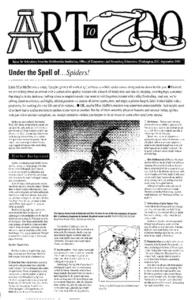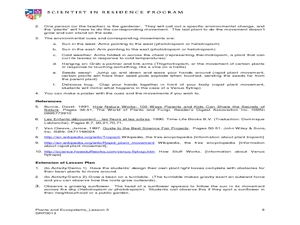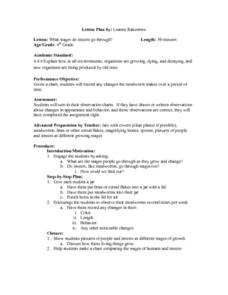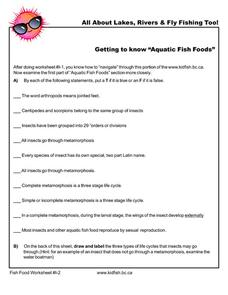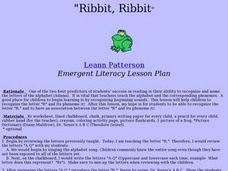Curated OER
Bug Detective
What happens when a living thing dies? After reading a paragraph of background knowledge on the life cycle of bugs, third and fourth graders work through four clues to figure out which bug is which. When they finish, they can study the...
Curated OER
Butterfly Lifecycles
What a great way to present this topic! While a little difficult to follow, this lesson plan provides great ideas for a second grade lesson plan involving butterfly lifecycles. Learners make drawings of butterflies, discuss life cycles,...
Curated OER
Those Busy, Buzz'n Worker Bees
Learners research information on worker bees. In this insect lesson, students review the body parts of insects and how bees find flowers. They discuss compound and simple eyes and the life cycle of a worker bee.
Curated OER
Insects
Students observe and identify insects in their local. They record their observations by drawing a picture of the insect and writing a description.
Curated OER
How Do We Know These Beetles Are Safe to Use?
Students evaluate the impact beetles have on plants. In groups, they select plants to expose to leaf-feeding beetles and place those beetles on the caged plants. They observe the beetles and discuss the insect and plant interaction...
Curated OER
Butterflies
Students study and create a pictorial report on the life cycle of butterflies. They explore the internet using the "hot list" handout to answers question on the life cycle of butterflies. They present their pictorial reports to the rest...
Curated OER
The Greatest Show on Earth: The World's Smallest Animals
Learners create instruments to capture different types of insects. In this The Greatest Show on Earth: The World's Smallest Animals lesson plan, students compare the attributes of certain insects and record the data on a chart. After...
Curated OER
Under the Spell of Spiders!
Students read about spider body parts, abilities, tendencies, and life cycles. In this Under the Spell of Spiders! lesson, students create mystery creatures that turn out to be spiders. Students catch and observe spiders and insects....
Curated OER
Insects Are Helpful!
Students see that insects do lots good and are very valuable to humans and nature. This is part of an ongoing effort to dispel fears of insects. They rotate through a series of centers that have examples of how insects contribute to our...
Curated OER
Insect Conservation
Students make a diorama. In this insect lesson plan, students review what they know and what they need to know about insects. Students define conservation, discuss why it is important to conserve insects, and make an insect diorama.
Curated OER
Plants Alive! How Plants Grow and Move
Students explore how plants move in response to the environment. In this plant activity, students engage in three different experiments to investigate how plants grow and move. Resources available in English and French.
Curated OER
Pond Life
Learners recognize the habitats of animals that live near or in a pond. In this pond lesson, students examine pond water and look for pond organisms. Learners observe organisms with a loupe and complete a worksheet.
Curated OER
What is An Insect?
Students investigate the concept of an insect. They conduct research about six different insects and identify the different body parts. Students look at the life cycle of the developing monarch butterfly. They also use the library to...
Curated OER
Web of Life - Ecosystem
Third graders play the roles of various organisms in an ecosystem (focusing on insects) and pass yarn or string around to other organisms from largest animals to the smallest. The end product is a web which shows how all of these animals...
Alabama Learning Exchange
Make a Difference!
We are very dependent upon other life forms around us to survive. Here, scholars explore relationships in the ecosystem with the help of Auntie Litter and the pollution patrol. They imagine a world without grass, making connections to...
Curated OER
Insects
Third graders research an insect and creates a brochure on that selected insect. Each student develops a Venn Diagram comparing similarities and differences between moths and butterflies.
Curated OER
What Stages Do Insects Go Through?
Fourth graders observe mealworms over a period of time and record any changes they observe. They record any changes in color, length, behavior, and any other noticeable changes, identify the stages of the mealworms, and create a chart...
Curated OER
Getting to Know "Aquatic Fish Foods"
In this fish worksheet, students access a website to learn more about the common insects eaten by fish. Then students draw and label three types of insect life cycles. This worksheet has 10 true or false questions and 3 drawings.
Curated OER
Web of Life - Insects
Third graders recognize the importance of insects in the web of life, construct a web of life that demonstrates the importance of the web of life and discuss the insects' role in the ecosystem. They recognize factors that change ecosystems.
Curated OER
Birth of a Butterfly
Learners demonstrate an understanding of insects and science as a whole and construct the life cycle of a butterfly using pasta. They first fold a piece of paper into four equal parts. In the upper left corner will be stage one (egg)....
Curated OER
Ladybugs
In this ladybug life style instructional activity, learners match 7 body parts to a diagram of a ladybug and draw the 4 different stages of a ladybug's life cycle.
Biology Junction
Nonvascular and Simple Vascular Plants: Mosses to Ferns
Sometimes conservationists use specific plants to prevent erosion or fight invasive species. A 50-slide presentation covers both nonvascular and vascular plants. It discusses the plants, their stages and life cycles, reproduction, uses,...
Curated OER
Ribbit! Ribbit!
Learners research a frog's life cycle and habitat using books, the Internet and lecture. Students make origami frogs, write letters to Toad from Arnold Lobel's "Frog and Toad" and participate in a simulated camouflage activity.
Prince William Network
The Incredible Journey
Divide your school gym into breeding grounds and non-breeding grounds so that your zoologists can play a game simulating the seasonal migration of shorebirds. Players pick one of the included game cards and follow its directions, which...









